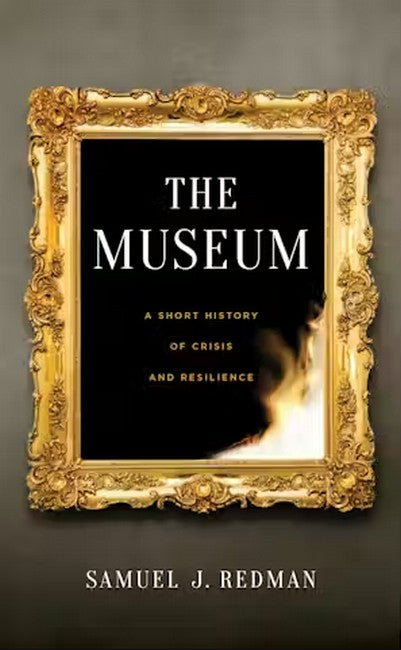Samuel J. Redman is Associate Professor in the Department of History at the University of Massachusetts Amherst and the author of Bone Rooms: From Scientific Racism to Human Prehistory in Museums and Prophets and Ghosts: The Story of Salvage Anthropology.
Request Academic Copy
Please copy the ISBN for submitting review copy form
Description
"The Museum: A Short History of Crisis and Resilience was a book born out of the pandemic. Originally conceived in early 2020 as a look at the current state of museums and where they were headed in the future, the project took on a new meaning - and a new trajectory - as the coronavirus swept across the globe...What emerged from that moment is a slender, taut work of scholarship that explores how museums have responded to crises both external and internal, beginning with the massive 1865 fire at the Smithsonian. In addition to the Smithsonian fire and the Spanish flu, Redman also looks at cataclysms like the Great Depression, the second world war, the coronavirus and the national protests following the death of George Floyd, as well as more existential crises like the culture wars of the 1980s and 90s and museums' own legacies as agents of colonialism and exploitation." * The Guardian * "The book springs to life in an account of the 1970 Art Strike in New York, a largely failed but influential effort to goad museums into denouncing the Vietnam War. (The Metropolitan's clumsy response gets deserved attention.) He causally links this to subsequent repatriation of Indigenous remains starting in the 1980s, and the maelstrom of controversy surrounding displaying the Enola Gay at the Air and Space Museum. Redman brings the story up to the minute in a final chapter contemplating the impacts of the antiracism movement and the global pandemic ... Contains many touchpoints of cultural history and is a timely, engaging read." * Library Journal * "Historian and professional Samuel J. Redman lends a fine analytical eye to the discussions that blend historical events with broader questions about museum operations, community presence, and special challenges. The result is a detailed blend of reports and analysis that charts the evolution of the museum and the nature of its contents." * Midwest Book Review * "The Museum: A Short History of Crisis and Resilience is the latest museological history by historian and former museum professional Samuel J. Redman...the author convincingly, succinctly, and accessibly argues that 'museums as institutions have proven extraordinarily durable as cultural concepts'." * Museum History Journal * "The Museum takes the reader behind the displays that present the public face of culture and science, to show how they have changed and will have to change to not just survive but to have relevancy in our age. The writing in this thought-provoking book on a subject not generally known is clear and well-organized" -- Robert S. Davis * New York Journal of Books * "Redman deftly considers the critical issues, past and present, that affect museums, offering a fascinating introduction to the ideology, hopes for, and problems of museum building and collection curation." -- Claire Potter, The New School "This wise book understands that crisis and conflict bring change because people must act whether ready or not. Redman examines five key moments over the past 150 years in the United States when war, economic downturns, and popular unrest from both left and right challenged and transformed the country's museums in ways that their leaders did not anticipate. An essential book for understanding the trajectory of US museums from the Civil War to the present." -- Richard Candida Smith, Professor Emeritus of History at the University of California, Berkeley "Redman deploys an innovative and provocative approach to considering the history of museums in the US during the twentieth century, framed in terms of how they responded to crises originating both within and outside the institution. The Museum presents a masterful synthesis of diverse historical sources offering the reader fresh insights into the role of museums in American society. Written to be accessible to a broad audience, it is the perfect text for anyone interested in the history of American museums, and more broadly twentieth-century cultural history." -- Raymond Silverman, Professor Emeritus of History of Art and Critical Museum Studies, University of Michigan

